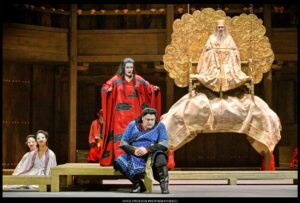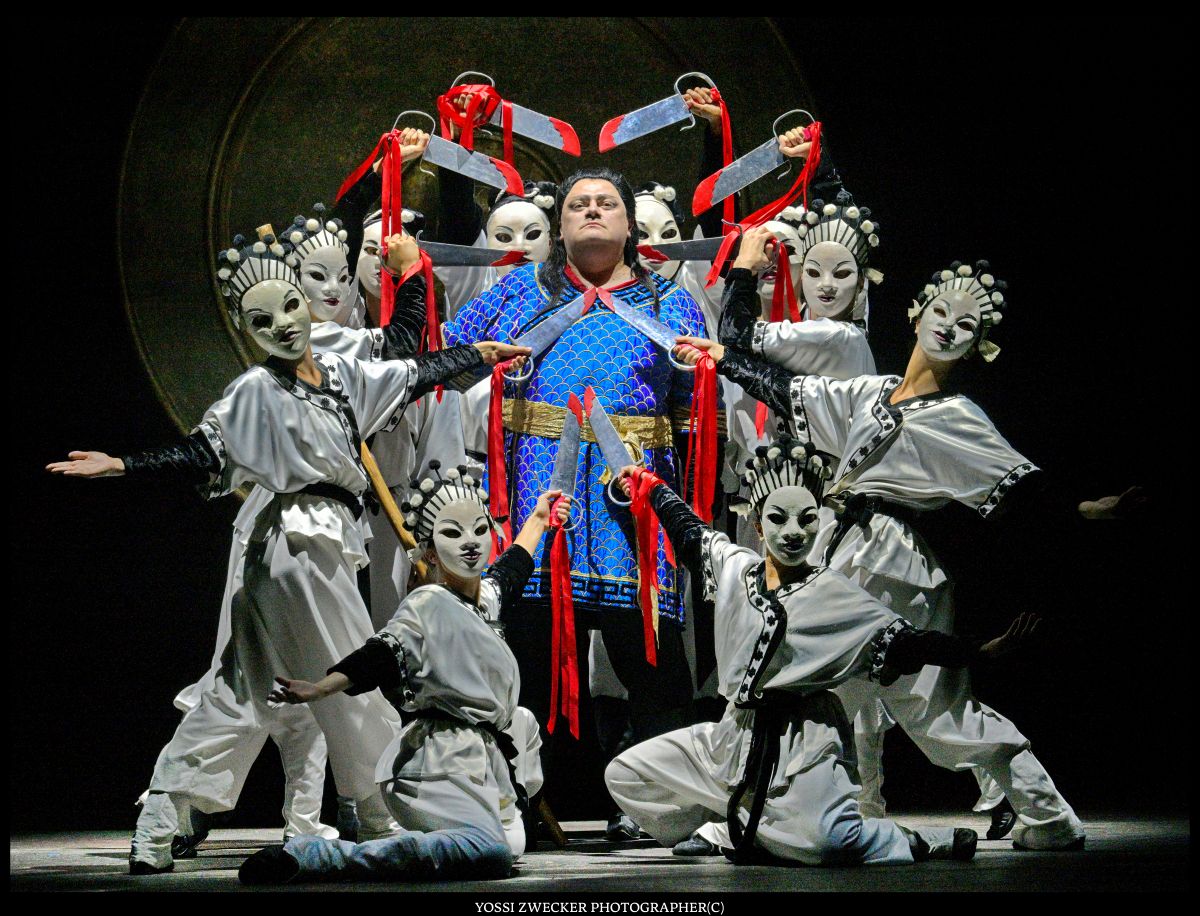When it comes to Turandot, few productions can rival the opulence and visual splendour of Franco Zeffirelli’s iconic staging, which premiered at the Metropolitan Opera in 1987. However, The Royal Opera’s 1984 production—frequently revived over the years—is a beautiful interpretation in its own right. Now staged by the Israeli Opera, it remains as visually striking as ever.
Andrei Șerban’s concept presents the tale of the vengeful princess who executes her suitors as a theatrical performance within a performance. Sally Jacobs’ set design evokes the atmosphere of an old theatre, reminiscent of Shakespeare’s Globe. The chorus is placed in the bleachers, overlooking the action from above. Most of the performers wear masks, which are dramatically removed at key moments. Only the three travellers from Tartary—Prince Calaf, his father Timur, the deposed king, and the slave girl Liu—remain unmasked. A particularly poignant moment occurs when Calaf, captivated by Turandot’s presence, sings of her beauty despite her face being hidden behind a mask.
At its core, Turandot is a story of female trauma ultimately healed through the power of love. Yet, the opera’s happy ending often feels somewhat unearned—perhaps unsurprisingly, as Puccini died in 1924 before he could complete it. One of the thoughtful touches in this production is its subtle reminder of Liù’s sacrifice at the pivotal moment when love triumphs.
Still, not every element of the staging is successful. For instance, the oversized moon that descends from the ceiling in Act I lacks visual appeal. In contrast, a far more striking moment comes when Turandot’s father, the aging emperor disillusioned by her cruelty, is lowered from above on a dazzling, radiant throne.
The war with Iran had previously delayed the staging of this production. Yet, despite the ongoing conflict in Gaza, the Israeli Opera succeeded in assembling an impressive cast of international talent for the principal roles. Russian soprano Elena Mikhailenko was outstanding in the title role. Her voice soared powerfully as she sang of her legendary ancestress, a woman raped and murdered by an invading prince centuries ago. As the icy princess slowly succumbed to love, her voice softened with striking nuance.

Making his Israeli Opera debut, Latvian tenor Aleksandrs Antoņenko delivered a commanding vocal performance with a rich, resonant voice, even though he was not in top form—audible throat clearing between arias hinted at some vocal strain. Still, he delivered a flawless rendition of Nessun dorma, one of the most beloved tenor arias in the repertoire. Dramatically, however, his portrayal left room for deeper emotional engagement. South Korean bass Insung Sim made a strong impression as the blind, aging Timur, conveying deep pathos as a father tormented by concern over his son’s perilous decisions.
In the role of Liù—the devoted slave who sacrifices her life for Calaf because he once smiled at her—Israeli soprano Alla Vasilevitsky gave a performance full of commitment. I am usually a great admirer of her artistry, but sadly, on this occasion, her rendition of Signore, ascolta! did not move me as it has in the past. Her plea for Calaf to abandon his pursuit of another woman, usually a heart-wrenching moment, fell short of its usual emotional impact.
The scene-stealing trio of Ping, Pang, and Pong delivered a strong performance, particularly in the opening of Act II, where their nostalgic yearning for life before their service at the palace was both poignant and well-executed.
Under the baton of conductor Dan Ettinger, the orchestra delivered a rich, expansive sound—larger than its actual size—bringing Puccini’s sweeping score to life with great vitality. The Israeli Opera Choir, joined by the young voices of the Moran Choir, also sang beautifully, contributing to the grandeur and emotional depth of the production.
Opera
The Israeli Opera Tel-Aviv-Yafo האופרה הישראלית תל-אביב-יפו
Music by Giacomo Puccini
Director: Andrei Serban
Revival director: Gadi Schechter
Choreographer: Kate Platt
Set and Costume Designer: Sally Jacobs
Conductor: dan Ettinger
Sung in Italian with Hebrew and English surtitles
Cast includes Elena Mikhailenko, Aleksandrs Antoņenko, Alla Vasilevitsky, Oded Reich
Running time: 2 hours and 45 minutes including 2 intermissions
Photo credit: Y. Zwecker

